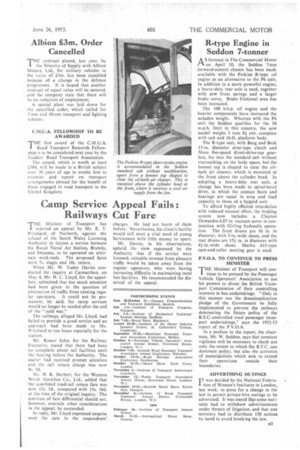Camp Service Appeal Fails : Railways Cut Fare
Page 37

If you've noticed an error in this article please click here to report it so we can fix it.
THE Minister of Transport has rejected an appeal by Mr. E. T. Pritchard, of Narberth, against the tefusal of the South Wales Licensing Authority to license a service between the Royal Naval Air Station, Brawdy, and Swansea, to be operated on alternate week-ends. The proposed fares were 7s. single and 10s. return.
When Mr. W. Tudor Davies conducted the inquiry at Carmarthen, on May 4, Mr. H. C. Lloyd, for the appellant, submitted that too much attention had been given to the question of abstraction of traffic from existing regu lar operators. It could not be permanent, he said, for camp services would no longer be needed after the end of the " cold war."
The railways, alleged Mr. Lloyd, had failed to provide a good service and an approach had beenmade to Mr. Pritchard to run buses especially for the station.
Mr. Rosser John, for the Railway Executive. stated that there had been no complaint about rail facilities until the hearMg before the Authority. The mailer had received prompt attention and the rail return charge was now 9s. ld.
Mr. H. R. Herbert, for the Western Welsh Omnibus Co., Ltd., added that the combined road-rail return fare was now I2s. ld., compared with 15s. 10d. at the time of the original inquiry. The question of fare differential should not, however, overrule other considerations in the appeal, he contended.
In reply, Mr. Lloyd expressed surprise over the cuts in the respondents'
charges. He had not learnt of them before. Nevertheless, his client's facility would still meet a vital need of young Servicemen with little money to spare.
Mr. Davies, in his observations, upheld the view expressed by the Authority that if the service were licensed, valuable revenue from pleasure traffic would be taken away from the regular operators, who were having increasing difficulty in maintaining rural bus facilities. He recommended the dismissal of the appeal.




































































































